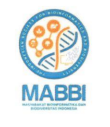- Focus and Scope
- Section Policies
- Peer Review Process
- Open Access Policy
- Archiving
- Publication Ethics
Focus and Scope
IJOBB is a peer-reviewed, published by Universitas Esa Unggul, Jakarta, Indonesia. The aim of this journal is to publish articles dedicated to all aspects of the latest outstanding developments in the field of Biotechnology and Biodiversity. Scope of this journal is Gene Editing, Big Data, Molecular Biology, Microbiology, Genetic Engineering, and Biodiversity.
Section Policies
Articles
Peer Review Process
Articles published in IJOBB have undergone in peer-review process. The peer-review is design to assess the validity, contribution, quality, and authenticity of articles for publication. The aims are to filter out articles that are not suitable for publication. The article review process is carried out by reviewers who are experts in their fields.
Before being reviewed by reviewers, the incoming article is first selected by an editor to see the suitability of the contents of the article with focus and scope of IJOBB. In addition, the style of article writing must also be adjusted to the style of the IJOBB environment. The editor will notify the author of the results of the first selection by the editor as soon as possible.
After the article is declared feasible in terms of focus and scope and in accordance with the IJOBB writing format, the article will then be reviewed by the reviewer. Articles sent to reviewers are blind review, i.e. the names of the author and reviewer is unknown. This aims to avoid subjective judgments because the writer and reviewer know each other. Reviewers will review articles for a maximum of 2 weeks, after which articles that have been reviewed will be returned to the authors for improvement. The author is expected to correct the articles as soon as possible and send the results back to the editor for further review by the reviewer. If accepted, the article will be sent to production and the author will get a notification.
Open Access Policy
This journal provides immediate open access to its content on the principle that making research freely available to the public supports a greater global exchange of knowledge.
This journal is open access journal which means that all content is freely available without charge to users or / institution. Users are allowed to read, download, copy, distribute, print, search, or link to full text articles in this journal without asking prior permission from the publisher or author. This is in accordance with Budapest Open Access Initiative
Archiving
This journal utilizes the LOCKSS system to create a distributed archiving system among participating libraries and permits those libraries to create permanent archives of the journal for purposes of preservation and restoration. More...
Publication Ethics
Indonesian Journal of Biotechnology and Biodiversity (IJOBB) has agreed to follow the ethical standards as determined by the Committee on Publication Ethics (COPE).
Author’s responsibility
- The authors must certify that their manuscript is their original work
- The authors must certify that the manuscript has never been published elsewhere
- The authors must certify that the manuscript is not currently considered for publication elsewhere
- The authors must participate in the peer review process
- The authors are obliged to provide retractions or corrections of mistakes
- All authors mentioned in the paper must make a significant contribution to the research
- The authors must state that all data in manuscript is real and original
- The authors must identify all sources used in making their manuscript
- The authors must report any errors they find in papers published to the Editor
Reviewer’s responsibility
- The reviewer must keep all information about the paper confidential and treat it as special information
- Writing articles must be done objectively, without personal criticism from the author
- Reviewers must express their views clearly with supporting arguments
- Reviewers must identify relevant published works that have not been quoted by the author
- Reviewers must also request that the Chief Editor pay attention to the substantial or overlapping similarities between the text being considered and other published papers that have personal knowledge
- Reviewers may not review the manuscript that contains a conflict of interest as a result of competition, collaboration, or other relationships or connections with any author, company or institution connected with the paper
Editor’s responsibility
- The editor is responsible for the overall content and quality of the publication
- The editors must always consider the needs of writers and readers when trying to improve publication
- The editor must guarantee the quality of the paper
- The editor must make corrections when needed
- The editor must base their decisions on only one importance, authenticity, clarity, and relevance of the paper to the scope of the publications.
- The editors must maintain the confidentiality of reviewers
- The editors must ensure that all research material they publish is in accordance with internationally accepted ethical guidelines
- Editors must act if they suspect a violation, whether a paper is published or not, and make all reasonable efforts to continue to get a resolution to the problem
- Editors may not rejected papers based on suspicion, they must have evidence of violations
- Editors may not allow conflict of interest between staff, writers, reviewers, and board members.








.png)

